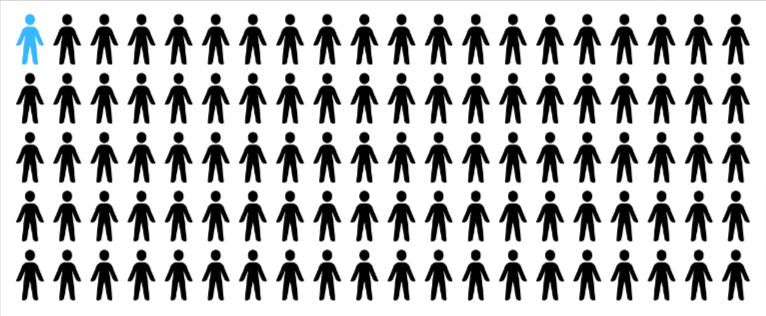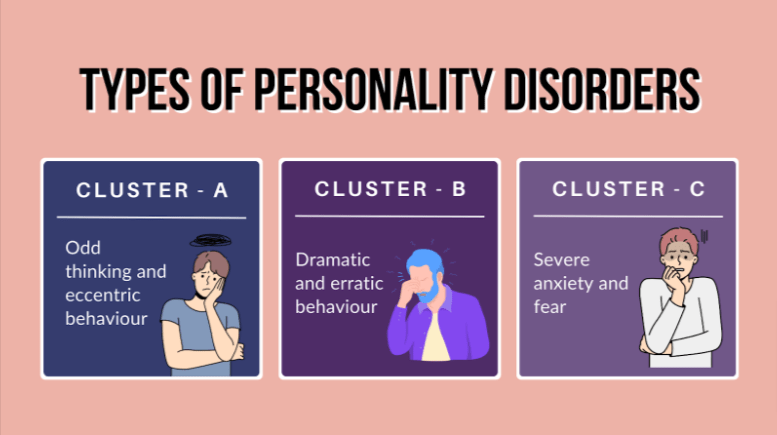Best Anxiety Treatment in Gurugram with Deep TMS Therapy: A Comprehensive Guide by Positive Mind Care and Research Centre
Anxiety disorders can be challenging to manage, but with the right treatment, significant improvement is...

Positive Mind Care and Research Centre is a leading facility mental health care facility of Delhi-NCR, dedicated to helping individuals to overcome mental illnesses and reclaim their joyful lives through a unique breakthrough technology called Deep TMS, which can reach significant depth and breadth of the brain and produce broad stimulation and functional modulation of targeted brain areas to help treat mental illnesses.
Personality disorders are a group of mental health conditions characterized by enduring patterns of behavior, cognition, and emotions that deviate significantly from societal expectations and lead to distress or impairment in various areas of an individual’s life. These patterns are deeply ingrained and usually manifest across a wide range of situations and contexts.
Personality disorders often develop during adolescence or early adulthood and can persist throughout a person’s life if left untreated. The specific causes of personality disorders are complex and may involve a combination of genetic, environmental, and developmental factors. Treatment typically involves psychotherapy, such as cognitive-behavioral therapy or dialectical behavior therapy, aimed at helping individuals understand and change maladaptive patterns of thinking and behavior. In some cases, medication may be used to manage specific symptoms associated with the disorders, but it is not a primary treatment for personality disorders themselves. Early intervention and support can improve outcomes and help individuals lead more fulfilling lives.
Personality disorders had a prevalence of 1.07%, with a preponderance of those aged 21-40 years (69.4%), men (64.9%), employed and students (37.3% and 32.8% respectively), unmarried (56%), graduates and undergraduates (27.6% each), and referred by the family (68.7%).

The symptoms of personality disorders can vary widely depending on the specific type of disorder, but there are some general characteristics that are often present across different types. It’s important to note that to be diagnosed with a personality disorder, these symptoms must be persistent, inflexible, and significantly impair the person’s functioning in various areas of life. Here are some common symptoms associated with personality disorders:
Distorted Thinking Patterns:
– Difficulty perceiving and interpreting social cues accurately.
– Tendency to misinterpret others’ motivations and intentions.
– Suspiciousness or excessive mistrust of others.
– Black-and-white thinking (all-good or all-bad perceptions of people).
Emotional Dysregulation:
– Intense and unstable emotions that can shift rapidly.
– Frequent and extreme mood swings.
– Difficulty managing anger, leading to frequent outbursts.
– Feeling empty or experiencing a chronic sense of emotional numbness.
Impulsive Behavior:
– Engaging in risky and potentially harmful activities without considering consequences.
– Acting on immediate impulses without thought for the future.
– Substance abuse or reckless behavior.
Problems with Interpersonal Relationships:
– Difficulty forming and maintaining stable, healthy relationships.
– Intense and stormy relationships with frequent conflicts.
– Fear of abandonment or an overwhelming need for closeness and attachment.
Emotional Instability:
– Intense fear of rejection or criticism.
– Chronic feelings of emptiness or loneliness.
– Difficulty tolerating being alone.
Cognitive and Perceptual Distortions:
– Belief in conspiracy theories or unusual beliefs not shared by others (in Cluster A disorders).
– Misinterpreting innocuous events as having significant personal meaning (in Cluster A disorders).
– Unusual perceptual experiences, such as magical thinking or illusions (in Cluster A disorders).
Avoidant and Dependent Behavior:
– Avoidance of social situations due to fear of judgment or rejection.
– Relying excessively on others for decision-making and emotional support.
Grandiosity and Attention-Seeking Behavior:
– Exaggerated sense of self-importance and entitlement.
– Seeking constant attention and admiration from others.
It’s essential to recognize that the symptoms can be quite diverse and nuanced depending on the specific personality disorder. Additionally, the symptoms of personality disorders can overlap, making diagnosis and treatment complex. If you or someone you know is experiencing significant distress or impairment in daily functioning due to these symptoms, it’s crucial to seek professional evaluation and support from a mental health professional. Proper diagnosis and appropriate treatment can lead to improved quality of life and better coping strategies.

Provides a convenient and flexible approach to treatment, allowing patients to receive care while maintaining their daily routines.
A non-invasive procedure that targets specific areas of the brain associated with depression. This innovative treatment option has shown promising results in reducing symptoms of MDD and is FDA approved.
A supportive and empathetic environment to express thoughts, emotions, and experiences, develop coping strategies, and gain insights to improve overall well-being.
Our center combines expert medical care with a compassionate and supportive environment, empowering individuals to reclaim their lives.
Cultivate awareness, reduce stress, and enhance overall well-being through meditation, yoga, and other practices to keep you grounded.
Our center combines expert medical care with a compassionate and supportive environment, empowering individuals to reclaim their lives.
Counseling for personality disorders involves psychotherapy, aiming to help individuals develop healthier thought patterns and coping skills. Common approaches include Cognitive-Behavioral Therapy (CBT), Dialectical Behavior Therapy (DBT), Schema Therapy, and Psychodynamic Therapy. The focus is on improving emotional regulation, interpersonal relationships, and self-awareness. Counseling may involve family involvement and supportive psychotherapy. It’s essential to work with a qualified mental health professional to create a personalized treatment plan and address the specific challenges associated with the individual’s personality disorder. The goal is to foster personal growth and positive change for a more fulfilling life.
We at Positive Mind Care and Research Centre, a new generation mental health clinic, are dedicated to providing the highest quality care and research in the field of mental health. We take a positive and holistic approach to mental health, focusing on the individual as a whole and their unique needs and circumstances. We are committed to using evidence-based scientific treatment methods, conducting research, and providing education and outreach to the community. Remember that you are not alone, and we are here to help you on your journey towards betterment!
Anxiety disorders can be challenging to manage, but with the right treatment, significant improvement is...
Obsessive-Compulsive Disorder (OCD) is a challenging mental health condition characterized by intrusive thoughts (obsessions) and...
Anxiety is a common mental health condition that affects millions of people worldwide.
Learn more about how Positive Mind Care innovative TMS treatment technology can be effective in treating psychiatric disorders.
Learn more about how DEEP TMS treatment technology can be effective in treating neurological disorders.
Disclaimer:- The information provided on this website is for informational & educational purposes only and should not replace professional medical advice. Please consult with a qualified healthcare provider for personalized treatment recommendations.
Copyright © 2023. Positive Mind Care. All Rights Reserved